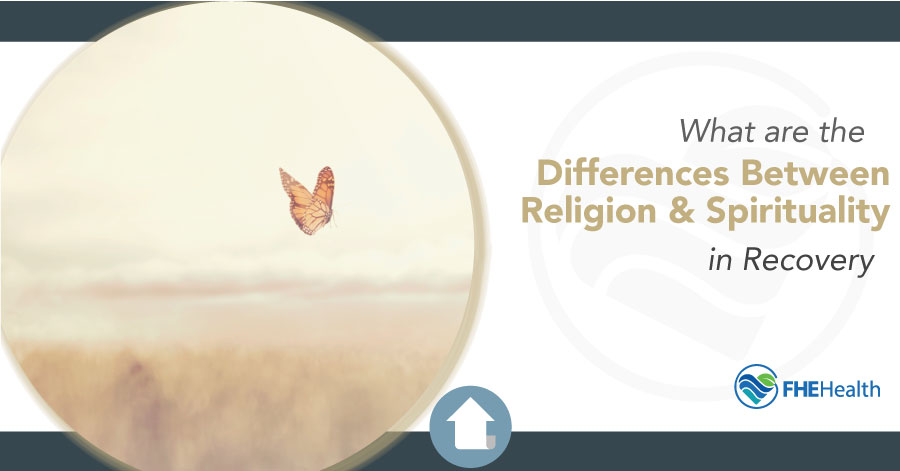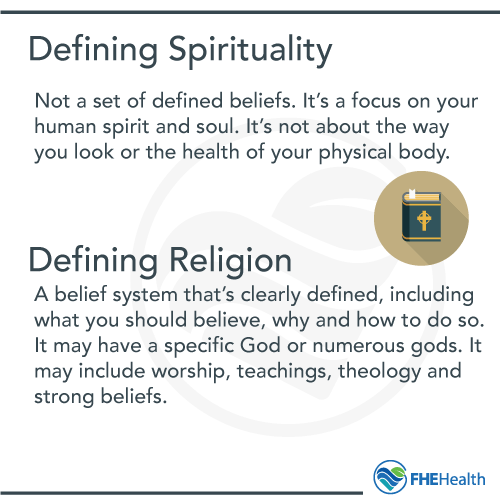
A component of the 12-step program is relying on a higher power for support and guidance. This fact of the 12-steps creates the perception it’s dependent on ‘becoming religious’, that’s an instant turnoff for many. Not does it imply judgment and self-criticism, many people have negative past experiences with religion. Fortunately, this concept of required religiosity is misplaced. Within recovery, it is essential that you find a level of spirituality and use that as a guide, but that’s not always the same as being religious. What is the difference between spirituality and religion, and how does it play a role in your addiction recovery?
Are Spirituality and Religion the Same Thing?
 Can you be spiritual and not be religious? The answer is yes, and with regard to addiction recovery, that’s an important aspect to understand. Some people fear religion for various reasons. It seems too cult-like. It doesn’t seem to make sense in our scientific-focused world. But you don’t have to believe in a specific religion to be spiritual. Confused?
Can you be spiritual and not be religious? The answer is yes, and with regard to addiction recovery, that’s an important aspect to understand. Some people fear religion for various reasons. It seems too cult-like. It doesn’t seem to make sense in our scientific-focused world. But you don’t have to believe in a specific religion to be spiritual. Confused?
Look at spirituality as inward-focused. It’s not about following specific rules set by a religion. Rather, view it as recognizing within your own consciousness that you’re more than just a physical body. You have a soul, and you have incredible potential to be more than what you are right now.
Defining Spirituality
Spirituality focuses on an in-depth look within yourself. It’s a focus on your human spirit and soul. It’s not about the way you look or the health of your physical body. When making decisions in your daily life, make them with an understanding of your spirit, what feels good and feels right to you.
You don’t have to follow defined beliefs to be spiritual. In one study, conducted by the Pew Research Center, 59% of Americans say they feel spiritual peace and well-being. They don’t necessarily align themselves with a religion, though.
Defining Religion
By contrast, religion is a belief system that’s clearly defined, including what you should believe, why and how to do so. It may have a specific God or numerous gods. It may include worship, teachings, theology and strong beliefs. You may find religion helps you become more spiritual, although some will say the structure of religion can be a roadblock to finding spirituality. Adhering to religion means you have a very specifically defined belief system that you can use as a guide through your day.
The Role of Spirituality and Religion in Recovery
When you understand the differences between religion and spirituality, you may be more willing to accept this component to the 12 Steps. It’s not uncommon for people to pull back because they think they have to join or be a part of a religion to do the 12 Steps.
You may find that reestablishing yourself in your religion helps your recovery. Because religion is very structured, it helps to support your pursuit of spirituality. Getting back to your belief system can give you significant strength and a clear path forward for managing the recovery process.
Some people find themselves unable to grasp religion. It feels too restrictive and doesn’t feel right. If your religion encourages a spirituality that you don’t connect with, it’s not possible to gain any benefits from it.
It’s okay to feel like that, but the fact is, a core component of recovery is spiritual. In recovery, you’re looking inward. You’re learning about yourself, what happened to you, and why you got to this place.
You’re likely going to need some type of spiritual revival to help you pull out of this place. It’s not easy to do, but having spirituality present during recovery gives you support and a path to follow. You may feel more comfortable exploring spirituality in a different light and with less restrictive focus.
A Deeper Look at Spiritual vs. Religious Recovery
There’s no wrong answer here. The difference between religion and spirituality is always something personal and meaningful to you. Consider these aspects of it.
With Spirituality, You Set the Rules
Religion has clearly defined rules. You know what you should and shouldn’t do. With spirituality, you follow what feels right or what’s in your heart. Listen to your belief system is, not what others tell you to believe.
Spirituality Lets You Uncover the Truth
You may find religion empowering and promising because it gives you the truth. It tells you specifically what is right and wrong. It also provides you with the ability to make decisions based on that truth. With spirituality, you uncover what’s true for you on your own time and path.
Both Should Focus on Support and Not Fear
Though religion may have a level of fear involved — if you don’t do what you’re supposed to, there are consequences — both can foster a sense of support and love. Spirituality does this without the fear of being left alone to manage the situation on your own.
You Need to Walk Your Own Path
While religion can provide a well-defined path for you to follow, you can take various routes. With spirituality, you have to make that path for yourself. In all situations, your goal is to look within yourself, determine what feels right to you, and then take a step toward your recovery.
How Spirituality Is Essential to Healthy Recovery
How can having a spiritual element in your recovery make a difference to your health and long-term well-being? Religious or spiritual focus can help to improve recovery outcomes. This may happen because you’re getting support and learning more about yourself and your value in the world.
Having a connection to a higher power can also be incredibly freeing. You may find that this leads you toward a better quality of life and a future that makes you proud.
It’s not just the process of saying that you believe in God or that you feel spiritually connected with yourself. You still have a lot of work to do on yourself and your addiction. What’s different is that you have purpose, value and a support system to help you through the process.
FHE Health Can Support Your Addiction Recovery
At FHE Health, we incorporate the 12 Step program into our drug and alcohol treatment programs. If you’re ready to begin your journey, contact our compassionate counselors now to discuss what your needs are. We’re available 24/7 at (833) 596-3502.






